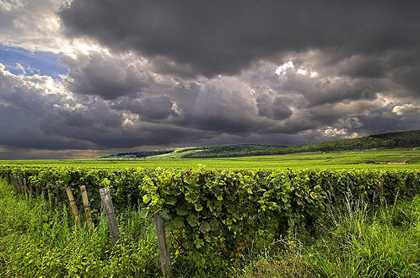Dr Vino's wine blog
wine talk that goes down easy
Overheard: if you are biodynamic, you’re not making wine in 2007
“We’ll see who are the real biodynamic producers this year. If they’re really biodynamic, this year they won’t have any wine.”
Such was the provocative statement a French wine insider told me last week. He was referring to the gray and damp vintage of 2007 in France. Time will tell.
The reason that it’s tough for biodynamic producers is that various vine maladies can creep in with rain. Treating them with chemicals is fairly easy, treating them without chemicals, as is the wont of BioD producers, is very labor intensive–or impossible, as this guy was implying.
Related:
“Bordeaux vineyards lose 90% of crop as rain and rot threaten French harvests” [Decanter.com]
“Bordeaux 2007 in progress: weather” [Dr. V]
(image, with permission)
Poll: do you buy organic wines?
 In my post-LiveEarth stupor, I decided to click an ad on a web site for The Green, a new TV program about environmental issues.
In my post-LiveEarth stupor, I decided to click an ad on a web site for The Green, a new TV program about environmental issues.
They have five “eco ideas for greener living.” Since the show is sponsored by Lexus, I found tip three amusing: “When choosing a chauffeur or a taxi service, consider a luxury car service that relies on a fleet of hybrids.” Uh, huh.
But tip number five was interesting in it’s claim: “Try an organic wine with dinner. These wines come from farms that practice eco-friendly techniques and produce superior results.”
Aside from the fact that it is difficult to legally call a wine organic (because of the addition of sulfites), what are “superior results”?
Have your say about “green” wine!*

poll now closed
The Green, Sundance Channel.
* “Green” wine is my catch-all term for the various shades of green: sustainable, organic, and biodynamic wines.
Arretxea, Hegoxuri, Irouléguy: unpronounceable words you should know
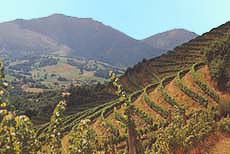 In the bit of the Basque Country that lies on the French side of the Pyrenees is the small appellation of Irouléguy. Don’t worry: I’d never heard of the steeply sloped vineyard area either.
In the bit of the Basque Country that lies on the French side of the Pyrenees is the small appellation of Irouléguy. Don’t worry: I’d never heard of the steeply sloped vineyard area either.
I was in the excellent little shop, La Derniere Goutte in the 6th arrondissement of Paris last week. I told Juan Sanchez, the American owner who seems to know everyone who comes into the shop, that I was looking for an interesting dry white and he pointed me to the Arretxea Hegoxuri from Irouléguy. It’s a blend of 50% petit manseng, 40% gros manseg, 10% corbu–and yes those are all grapes. It’s partially barrel fermented.
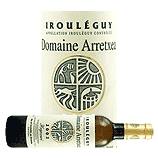 With wildly aromatic notes of tropical fruits–pineapple, melon–the dry wine has a wonderfully balanced acidity and mountain mineral verve on the palate. It’s no doubt makes it the best petit manseng you’ve ever had. And the vignerons, Therese et Michel Riouspeyrous, farm biodynamically.
With wildly aromatic notes of tropical fruits–pineapple, melon–the dry wine has a wonderfully balanced acidity and mountain mineral verve on the palate. It’s no doubt makes it the best petit manseng you’ve ever had. And the vignerons, Therese et Michel Riouspeyrous, farm biodynamically.
But the story does not end there. Bottled as a humble vin de table yet sells for 20 euros, the wine was meant to be an appellation wine. According to the back label, the natural fermentation was slow in 2005 and when it came time to give a sample to the mandatory taste-test component of the residual sugar level was 0.2 grams above the appellation limit. So rather than mess with the wine, the Riouspeyrouses decided to bottle it as a vin de table. That explains why there’s no vintage or region on the wine. And why Juan Sanchez rolled his eyes about how the appellation system doesn’t always help natural wines.
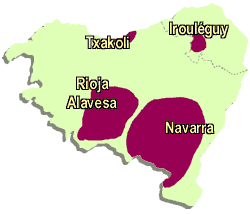 Someone must import the wine to the US since it is available at Smith & Vine in Brooklyn for $28 (find this wine). The price is a little high–if it were $15 wine it would be a screaming buy–but with the dollar tanking, it’s not likely to get any cheaper, sadly.
Someone must import the wine to the US since it is available at Smith & Vine in Brooklyn for $28 (find this wine). The price is a little high–if it were $15 wine it would be a screaming buy–but with the dollar tanking, it’s not likely to get any cheaper, sadly.
Congratulations to Steve who correctly guessed this difficult, mystery vineyard location–we’d expect nothing less from the founder of the Wine Century Club!
How I gave up bottled water and lived to tell the tale
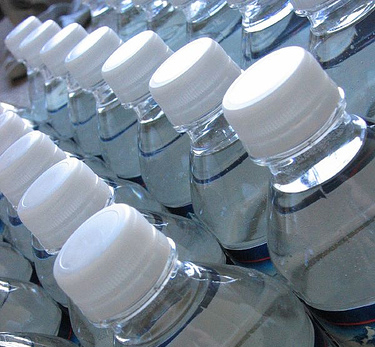
Yes! I made it 30 days with no (er, little) bottled water! And I’m not even living in a yurt, making clothing from alpacas that I’m raising, and eating exclusively local root vegetables.
Thirty days with no bottled water may not seem like a lot. And, quite frankly, it’s not. I didn’t bring Aquafina to their knees. And I did cause myself a lot of inconvenience.
For those of you who just tuned in, the logic behind my self-imposed ban on bottled water (and soda) is a form of my own carbon offset. Yes, it would have been a lot easier to pay $15 to buy some credits. But I wanted to take matters into my own hands and go bottle-for-bottle offsetting the carbon of my wine consumption. My logic was that the wine I enjoy is unique while the bottled water I can buy at every corner shop is easily substitutable with tap water and a little planning.
So what I’ve learned:
* Try not to blast the air conditioning with the windows open (actually I jest–the AC was coincidentally–and annoyingly!–broken during the entire period).
* NYC tap water really does taste like chlorine. And it is best served cold, VERY cold.
* Refilling the same Poland Spring bottle for a few weeks straight isn’t the best idea.
So am I going to keep up the ban forever? No. But I’m going to reduce the amount of bottled water, especially non-sparkling, that I buy. In fact, British consumers were urged last week to substitute French wine for New Zealand wine in the name of finding a wine that had fewer “food miles” under its belt.
This is nonsense. British wine consumers should instead celebrate the diversity of distinctive wines from around the globe and instead perform their own offsets and drink tap water. Or something else less fun. Just don’t give up the diversity of wine!
So what am I going to drink to celebrate? You might think a big glass of Pellegrino. But actually, since I included all club soda and tonic water, I have been thinking about a Tom Collins (gin, lemon juice, simple syrup, and club soda) ever since I read Eric Felten’s WSJ article ten days ago. So tonight I’ll be mixing up a cocktail before dinner. And maybe I’ll just have a glass of tap water to go with my wine at dinner.
Exchange this! NZ horticulturalist is fired up about carbon
 Craig Foss is madder than hell. And who has caught the ire of this New Zealander? The Times of London, for running a table suggesting that British wine consumers could switch from New Zealand wines to French wine to reduce their carbon footprint.
Craig Foss is madder than hell. And who has caught the ire of this New Zealander? The Times of London, for running a table suggesting that British wine consumers could switch from New Zealand wines to French wine to reduce their carbon footprint.
The Times had the audacity to reproduce a table from the new book The Low Carbon Diet by Polly Ghazi and Rachel Lewis. In it, the authors suggest that such a wine switch would reduce carbon usage by 0.068kg/bottle. That’s in an overall annual diet of 10,000 kg of carbon consumption.
Why should the world care if Craig Foss is mad? He’s New Zealand’s opposition National Party horticultural spokesman, people! Do try to keep up.
So let’s help Foss channel his anger correctly:
1. Get mad at Ghazi and Lewis first, then the Times.
2. While Brits may care about the carbon footprint, British wine drinkers don’t really care about it (yet). Heck, they don’t even care about organic and biodynamic according to a recent study. Maybe focus on that shade of green instead of transport.
3. Don’t get mad, get even. The fact is, New Zealand is always going to be a long boat ride (note: not air) from the UK. So how about making a push for kiwi growers to all become sustainable and swear off synthetic fertilizers and pesticides? That would make the long sea voyage a wash. Now that’s something eco-conscious wine drinkers could raise a glass to (once they become eco-conscious, that is–see point two).
“Carbon footprint puts boot into wine” [NZ Herald]
“Low carbon diet masterplan” [The Times UK, pdf]
Carbon footprint: should wine be shipped in bulk tanks?

Should wine be imported in bulk tanks to the country of consumption and then bottled there? It reduces the carbon footprint of wine. But what about the quality?
At the London International Wine & Spirits Fair (LIWSF) today, a group made such a case. The Waste & Resources Action Programme presented a paper study today arguing for the efficiencies. They no doubt have a commercial interest to gain in such a switch but here’s an example of their reasoning:
“Shipping wine from Australia [to the UK] in bulk reduces CO2 emissions by 164g for each 75cl bottle, or approximately 40% when compared to bottling at source,” they write. They continue to say that 10,584 liters of bottled wine fits in one container versus 25,000 liters of wine in a bulk tank. (But did they count for the bottles making a round trip?)
My initial reaction to this would be a big “no tanks.” After all, shipping and rail have to be so much incredibly more efficient from a carbon perspective than trucking or (gasp!) air.
As a wine geek, I’m worried about quality first and carbon second. But I recently had the charming Terra Rosa malbec from Argentina, which is brought to California for bottling so it may not be such a dire tradeoff. As long as everything is properly labeled, maybe there is a future for entry-level wines to be transported this way.
What do you think? Sound off in the comments!
Related: “Bottling Wine in a Changing Climate” [WRAP]
Update: bottled water ban
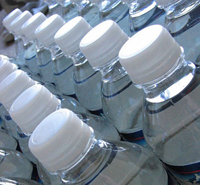 As I was watching planes take off and land last Friday at LaGuardia, I contemplated the folly of my bottled water ban. Jets roared overhead burning carbon and spewing emissions and I am doing what–not drinking a few bottles of water in the name of carbon neutrality? My ban seemed so piddly.
As I was watching planes take off and land last Friday at LaGuardia, I contemplated the folly of my bottled water ban. Jets roared overhead burning carbon and spewing emissions and I am doing what–not drinking a few bottles of water in the name of carbon neutrality? My ban seemed so piddly.
But that doesn’t mean it is easy! I had to remembered to bring my water bottle with me, filled up from home. Then I had to chug it in line at the TSA to go through devoid of fluids. Then fill it up again on the other side of TSA at the drinking fountain.
Nor have I been without transgressions–yes, I fell of the water wagon in less than a week! At a lunch, an overly enthusiastic waiter poured me a glass of Pellegrino. Then I had the ridiculous choice of throwing away perfectly good water or drinking it. I drank it and asked for tap water next time. As the level of that water lowered, I got refilled with Pellegrino.
It would be so much easier to drink bottled water at will and just pay $15 and buy some carbon offsets…
Carbon neutral: keep wine, ditch water

I’m giving up water for 30 days. Bottled water that is.
In the discussion of the carbon footprint of wine here last week, I floated the idea of purchasing carbon offsets to assuage carbon guilt. In case I had any doubt of the efficacy of this matter, an excellent column in the Financial Times last week on the subject of offsets made me put paid to this notion.
A hilarious quote compared the system of carbon offsets to “the medieval system of indulgences, in which corrupt priests absolved sins for haggled fees.” The author, John Guthrie, went on to say that the practice of buying tracts of forest land for protection as offsets may be out of favor now. The band Coldplay bought 10,000 mango trees in southern India to offset the carbon produced by the release of their second album. Five years later, the trees have now withered and died.
So if I am to make my wine drinking carbon neutral, I can’t buy my way out of it: I actually have to give something up. I figure I should go beverage-for-beverage, in other words, keep wine, and give up something else. I’d love to say that I would give up soda, but since I haven’t had a soda in something like 15 years, that would kind of be like my giving up snowmobiling, jet-skiing, and being driven to work in a stretch Hummer limousine (oh wait, that last one actually WILL be tough to give up).
Because the kind of wine that I enjoy is a unique product that can’t be replaced locally, I have another target in my sights that can: bottled water. It’s one of those paradoxes of the global era to be able to buy spring water from the French alps or the islands of Fiji in New York when there is abundant drinkable tap water available (unlike some countries, the efforts of a current UNICEF campaign). And, as a commenter pointed out in a previous posting, this chart shows that bottled water’s growth rate is faster than wine–it must be stopped!
So for 30 days I’m not going to consume any bottled water. Just what kind of a sacrifice will that be? Granted, not a huge one. I might save the world something like 30 bottles of water. But it’s a start. And I may even extend it if I can live without my favorite Gerolsteiner. So if you’ll excuse me, I have to go and fill up my water bottle at the drinking fountain.
(image)
